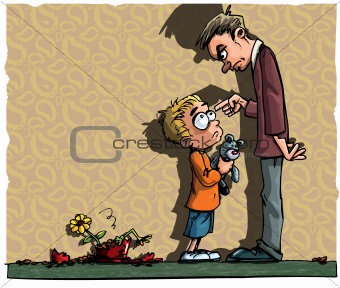
[Passage]: Read Joel 2:23
"Pppppiiiiiaaaaannnnggggg~" Ken had broken the antique vase in the house. Just 5 minutes ago, Ken's dad had just warned him not to play football in the house. But Ken would just not listen. While Ken was imagining that he was the first Malaysian to be a Manchester United player, and that the game entered the penalty shootouts, and that it was up to him to score the winning goal, unbeknown to Ken, he kicked the ball a tad too hard, causing the ball to deflect from the wall at such a great velocity that it hit dad's expensive and precious antique vase. "KEEEEEEEEEEEEEEEEEEENNNNNN!" shouted dad, with anger heard in his voice. Ken shivered with fear in anticipation of what will be his fate. Dad stomped to where Ken was, gave his a good scolding till Ken cried badly, as if someone had beat him up. Dad ended the scolding with, "Son, you are now grounded for a whole month. Come into the room with me!" As Ken entered the room, he saw his dad with the cane. Dad gave him 3 strokes on his bottom. Crying, Ken turned to his dad and said, "I'm sorry, dad. I will not do it again. I will listen to you next time." Dad put down the cane, hugged Ken, and explained to him why he had to be punished, and ended with, "I love you, son." Holding Ken, they both went to the living room and dad gave Ken an ice-cream, of which Ken ate heartily.
The story above is a modern day scenario of what Joel 2 was talking about. A warning was already given and not heeded (as is common to Israel). Joel 2 begins with an extended description of what is going to befall Israel, followed by a serious call to repentance. But Joel 2 just does not end with the call to repentance. The beauty of Joel 2 is that it ends with the Lord's response if the people repented (read Joel 2:18-32). Joel 2:23 calls the citizens of Zion, who mourned in Joel 2:15, to rejoice! Don't wallow in self-pity any longer, or be upset with the destruction or punishment that the Lord had to carry out. Rather, rejoice in what the Lord is doing now! The Hebrew word for early rain there could probably mean teachers. In another sense, God is telling the people not to be depressed but rejoice and be thankful - for the fact that God had sent them people to forewarn the people about the coming punishment and call them to repentance. After repentance, God pours out His blessings to the people abundantly, like the latter rain. What is the latter rain? For half the year Palestine is generally dry. The rainy season begins with the early rains usually in late October to early December, followed by the latter rains in March and April. Without these rains productive farming would not be possible, as Joel’s original readers knew only too well. The forewarnings as well as the punishment is then like the dry season and the blessings that come afterwards are like the latter rain that the farming community await for in order to farm. Like Joel's call, whatever hardship and difficulty we are going through, let us rejoice in the fact that God will never leave us and that He will vindicate us and afterward, we will see His mercy and grace.
[Response: Thank God for His blessings and mercies that He has shown and poured into your life. Recount the times where God has shown His mercy and grace and just thank Him. Ask God to help you to not look at the hardships that you are going through, but rather thank Him for His faithfulness.]
[Action: Like in Joel, God did not just forgive His people, but He restored them to the situation they were before, if not better. God took action rather than just merely uttering words of forgiveness. Is there someone you need to forgive today? If there is, go to that person and tell that person that you forgive him or her. Once you have done that (if there is no one you need to forgive, look for someone you have forgiven), do something for that person. It could be as simple as treating that person to a meal, or just spending time with that person, whatever it may be, do something for that person to let the person know that you sincerely have forgiven him or her.]


0 voices made known:
Post a Comment